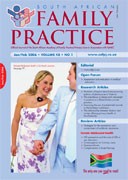Predictors of topical steroid misuse among patrons of pharmacies in Pretoria.
Keywords:
Topical steroid, misuse, abuse, skin lightening, peer pressure, black female African
Abstract
The misuse of topical steroids, i.e. the usage of these products for skin lightening, is a widespread phenomenon among African men and women. Studies have reported prevalence rates of 18.5% to 70% among participants. Though women constitute the majority of users, people of various age groups, socioeconomic status, employment and marital status practise skin lightening. Besides topical steroid products, other commonly used products include preparations containing hydroquinone or mercury derivatives. The misuse of these products is associated with skin problems such as cellulitis, contact eczema, bacterial and fungal infections, Cushing’s syndrome, acne, skin atrophy and pigmentation disorders. Although these effects are well documented, it seems that there is little awareness of them among the general public. Other less commonly reported problems include delaying the diagnosis of leprosy, and erythrodermic psoriasis. Data on the misuse and side effects of topical steroids have been gathered primarily from prescriptions, despite the fact that these products could be obtained over the counter, shared between relatives or friends, or come from other informal sources. Moreover, we found no community-based study that investigated the prevalence of the misuse of topical steroid products in South Africa. This survey was therefore conducted to examine the misuse of topical steroid products for skin lightening, among patrons of pharmacies in Pretoria and to determine the potential predictors of misuse. Methods: The aim of this study was to examine the misuse of topical steroid products for skin lightening by patrons of pharmacies in Pretoria and to determine the potential predictors of misuse. Exit interviews were conducted at 21 randomly selected pharmacies by trained interviewers using a structured questionnaire. A total of 1 228 patrons were approached, of which 225 gave verbal consent to be interviewed. Results: Of the 225 participants, 83% were female, 50.7% were 20-40 years old, 56% were employed, and 53.3% were married. The majority of participants (75.1%) were black Africans. About half of them (50.2%) had high school education. The prevalence of topical steroid misuse for skin lightening was 35.5%. A logistic regression analysis revealed that being a black female African and initially being advised to use the products by a friend were the only parameters that significantly correlated with topical steroid misuse. Conclusion: In conclusion, the prevalence of the misuse of topical steroid products among the respondents was 35.5%. The following predictors were associated with topical steroid misuse: being a black female African, not being aware of the side effects of these products, and initially being advised to use the products by a friend. In a logistic regression model, the last two predictors were the only parameters that significantly correlated with topical steroid misuse. (SA Fam Pract 2006;48(1): 14)
Published
2006-02-20
Section
Original Research
By submitting manuscripts to SAFP, authors of original articles are assigning copyright to the South African Academy of Family Physicians. Copyright of review articles are assigned to the Publisher, Medpharm Publications (Pty) Ltd, unless otherwise specified. Authors may use their own work after publication without written permission, provided they acknowledge the original source. Individuals and academic institutions may freely copy and distribute articles published in SAFP for educational and research purposes without obtaining permission.

